English Matters - Fall 2019
A newsletter for faculty, students & alumni of the Grand Valley State University English Department
Notes from the Department Chair
Welcome to the Fall 2019 issue of the English Department’s newsletter. I’ve worked in the academy for a long time and have received newsletters from many other departments, colleges and academic organizations. One reason why our newsletter is different (and, we think, even more worth reading) is that it contains actual news—that is, new information, things you couldn’t learn from other GVSU publications or even our department’s website. For example, you’ll notice that our newsletter contains a section entitled REVELATIONS, in which faculty members “reveal” something about their lives and work that not many people know. We see this as a way of opening the door of our department to our readers, to our present and former students and their families, perhaps even to future students. We want to welcome you to a more behind-the-scenes look at what drives and motivates the excellent teaching and scholarship our professors bring to the work of the English department. We hope you enjoy this issue and that you are inspired by the revelations it contains.
[1518122388].jpg)
High-Impact Students
Undergraduate Students
AMANDA GABRIEL
English and Education double major, Secondary Education concentration; Applied Linguistics minor
From November 22nd to November 24th, I attended the National Council of Teachers of English Annual Conference in Baltimore, Maryland. On Saturday morning, I had the honor of presenting with Dr. Pezzetti and GVSU alumna Erica Ruffner in a workshop we called, “Thinking Queerly About Literature and Life.” It was great to share the awesome work we’re doing at GVSU with teachers from all over the country. Attending the conference was exciting and a new experience for me – I’ve never seen so many English teachers (and people with round-framed glasses!) in one location. One of my favorite sessions reminded me about how important it is to not only be a teacher but also to maintain my own love of writing and bring that passion into my classroom. I hope that next year as a first-year teacher I’ll be able to attend NCTE 2020 in Denver!
LINDSAY GIBSON
English major - Language & Literature; Sigma Tau Delta chapter president
I attended the Sigma Tau Delta convention last year in St. Louis, Missouri, where I had the opportunity to present my paper “Satan in Paradise Lost: Analytical Thinker, or the Original Martyr?” as part of a four-person session on the works of John Milton. My panel mates and I each presented our papers, followed by a question and answer section with students and professors from across the country where we discussed our inspirations and defended our stances on the material. Because of my wonderful experience at the convention and the stories I’ve heard from other chapters, I was inspired to try to motivate our chapter at GVSU to have a more active presence than we have in the past. I’ll be stepping in this January as president of our chapter for the 2020 year with the hope that I can help our members become aware of, and participate in, the many opportunities that Sigma Tau Delta holds for us.
SADIE HUIZEN
English and Education double major, Elementary Education concentration
It was an honor and privilege to have taken part in the Daniel Pearl Harmony for Humanity concert at East Grand Rapids High School. After weeks of research and preparation, my classmates and I became very passionate about educating the public about the refugee journey and experience. The novel Story Like The Wind was a beautifully illustrated representation of this as it was accompanied by the orchestra. As presenters, our main goals were to interest, educate, and call to action those in attendance of the concert. One of the most rewarding parts of the entire experience was seeing the interest of those who attended. After the concert, we provided additional information as well as ways to get involved in local refugee resettlement programs. I am very grateful for the opportunity to not only educate the public, but to encourage others to take action and get involved with this important and growing global issue.
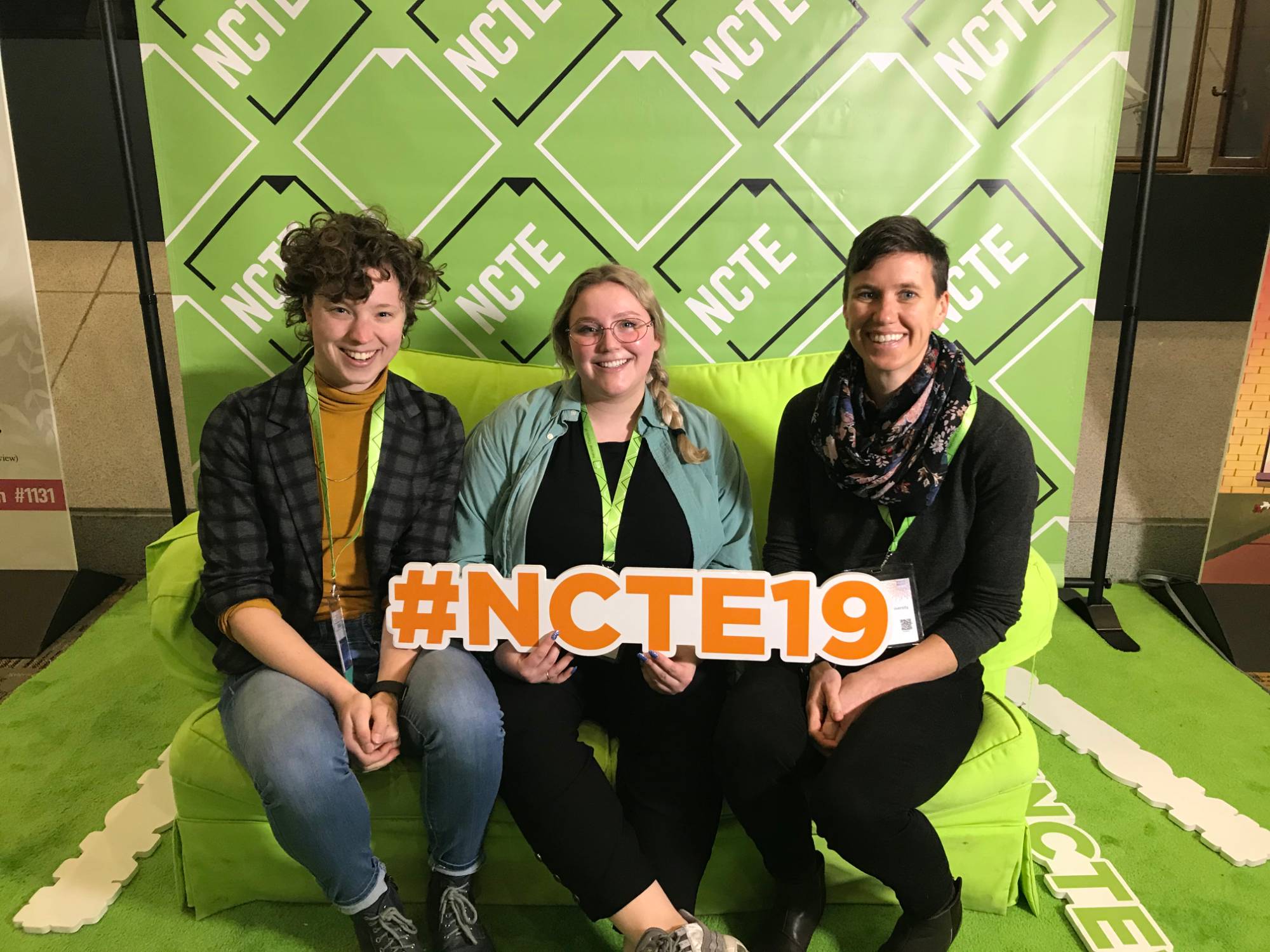
Erica Ruffner, '18, Amanda Gabriel and Professor Karen Pezzetti at the National Conference of Teachers of English
Graduate Students
ALICE POZZOBON
BA in English, 2019; current Master of Arts in Applied Linguistics student
Being an MA Applied Linguistics student and before, a GVSU English major, I was aware of teaching approaches or how to adapt a curriculum to the learners’ needs. However, at this year’s MITESOL conference, all of the sessions I attended made me critically think about the psychological side that learners are experiencing and how this affect their learning. My takeaway from this event was that there is much more than teaching methods or the four language skills to teach ESL learners - there are the valuable experiences that each one of them bring to the classroom and will affect the language acquisition process. In teaching immigrants and refugees, every little aspect of each student has to be taken into consideration in order to allow them to succeed in a new country and integrate in the community. It was an incredible experience and I am looking forward to next year’s conference, hoping I can participate as a presenter!
NICK LANGENBERG
Master of Arts in English
By participating in the 3MT Competition, I was offered a valuable opportunity to practice speaking in clear and concise ways to an audience that is relatively unfamiliar with the methods of literary studies. In order to do this successfully, participating students must think and express themselves in ways that are quite foreign to the traditions of most academic disciplines; they must resist the temptation to rely upon disciplinary jargon, they must connect their work to the work that is being done in other fields, and they must help the audience easily understand how their single power-point slide relates to the three-minute speech they are presenting. After participating in the 3MT competition, I felt more excited and hopeful about the future of academic undertakings than I have felt in a long time. Knowing that competitions like 3MT are taking place every year at universities all around the world helps me feel confident that even in this age of extreme specialization, academics of the future will be able to incorporate their particular work into the greater discourse that is taking place all around us.
ASHLEY QUINN
Master of Arts in English
In March, I presented a paper at the MELUS (Multi-Ethnic Literature of the United States) conference in Cincinnati, Ohio. The MELUS conference was a refreshing and enjoyable experience, and--simultaneously--exciting and intimidating. Despite the low turnout, I had a pleasant time presenting and then discussing my paper in such an intimate atmosphere. MELUS was a wonderful opportunity, and I would encourage any English student to present or just attend the conference in the future. I was able to connect with many other graduate students as well as senior scholars working in the field of multi-ethnic literature. Presenting at a conference was an experience that built my professionalism, allowed for broader networking, and inspired me to continue the work I am doing within the field of literature.
High-Impact Alumni
Roda Shope, '94
After graduating from GVSU in 1994, I embarked on my teaching adventure with Rockford Public Schools. After 20+ inspirational years in the world of elementary education, I decided I was determined to make my lifelong dream a reality...
As a young girl, wearing braids and a bucket hat, I had a passion for beautiful blooms and buzzing bees. I would find myself mesmerized for hours in my father’s garden, attempting to capture these brilliant creatures with my simple Kodak camera. Although the majority of my photos returned blurry, I persevered! It was my hope to one day create a safe haven for these amazing and beneficial creatures. In 2014, after many years of dreaming, researching and planning, Indigo Acres Apiary was established.
Indigo Acres Apiary is nestled on 13 beautiful acres in Rockford, Michigan, filled with pollinator gardens and humming with the voices of sweet honeybees and local pollinators. Our motto is simple, “Plant a Flower, Save a Bee."
I share my passion for the education and preservation of all pollinators, through Indigo Acres Apiary’s educational services. There is nothing more exciting than observing children being inspired through a wildflower/pollinator hunt or a family in bee suits, exploring the inside of a honey bee colony.
I still spread knowledge daily, through written and spoken word, just in a different environment. Although my educational space is now filled with beautiful blooms and buzzing bees, I continue to incorporate many elements of my English degree, throughout my small business. From writing educational programming and marketing materials, to developing social media and website content, my degree continues to support my daily interactions with individuals locally and beyond.
Most days, you will find me (still in braids and a bucket hat) capturing and sharing the life of these magnificent creatures, through art, macro photography, and educational sessions. Let’s BEE inspired together!
For more information, visit www.indigoacresapiary.com You can also find Indigo Acres Apiary on Instagram and Facebook.
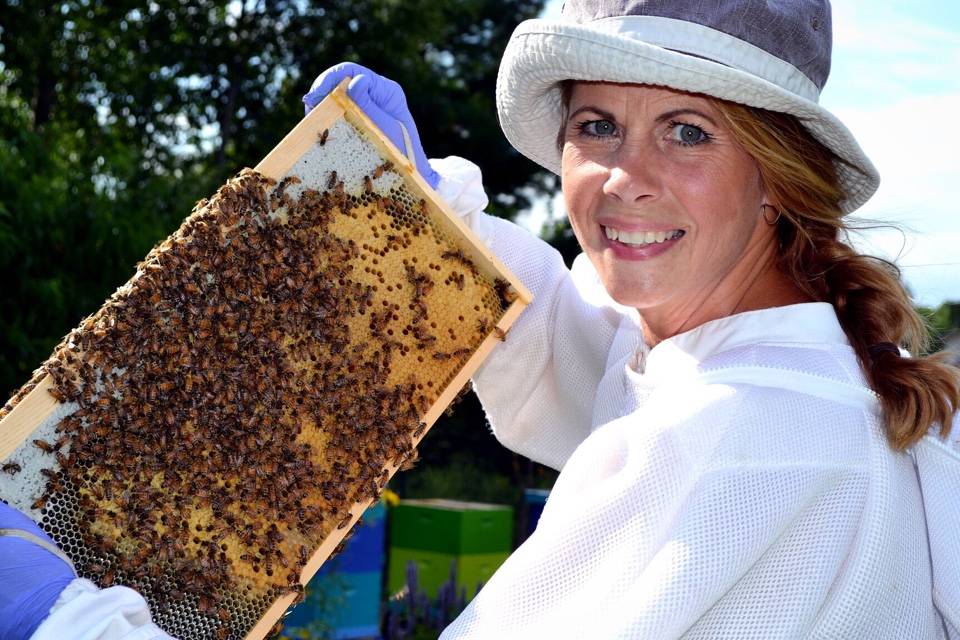
High-Impact Faculty - Publications
Brian Deyo, PhD
My journal article, “Ecophobia, the Anthropocene, and the Denial of Death,” was published in Interdisciplinary Studies in Literature and the Environment, 26:2, Spring 2019. The article was published as part of a special cluster on the emerging interdisciplinary field of ecophobia studies. In the article, I employ work from diverse disciplines—including cultural anthropology, psychoanalytic theory, evolutionary theory, and the environmental humanities—to speculate on the biological, psychological, and cultural origins of climate denialism.
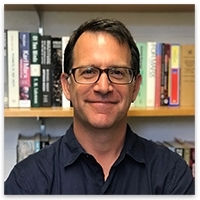
Regis Fox, PhD
My book, Resistance Reimagined: Black Women’s Critical Thought as Survival, was published by University Press of Florida in 2017. In part, the book explores why certain historic figures are celebrated as true symbols of the fight for racial equality, and others—like Harriet Wilson, Elizabeth Keckley, and Anna Julia Cooper—are not. It examines ingrained, even dangerous patterns of remembrance and what they suggest about future models of black leadership and community. In essence, the book asks: what images best account for our full humanity? What standards determine our expectations for leadership and how might those preferences be revised in our twenty-first century present? Historically, what modes of political awareness and performance do we allow to speak and stand up for our communities? What forms can, and must resistance take? What are the consequences if we refuse to move beyond narrow parameters of empowerment? And most importantly perhaps, what’s next?
[1524079997].jpg)
Kate Remlinger, PhD
My presentation, "Touring the UP's Linguistic Landscape," was invited by the Upper Peninsula Environmental Coalition. In the talk, I discussed how the tourism industry has shaped the idea of what it means to be a "Yooper," and ideas about the local dialect.
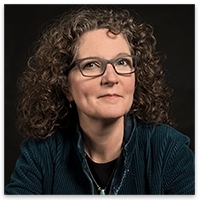
Rob Rozema, PhD
I published an article in the September 2015 issue of English Journal. Titled "Manga and the Autistic Mind," the article examines how manga reveals the way individuals with ASD process the world, and explores how manga can serve as a teaching tool for neurotypical and neurodivergent students. The article, available here (PDF), recently won the 2016 Edwin M. Hopkins award for an outstanding article published in English Journal.
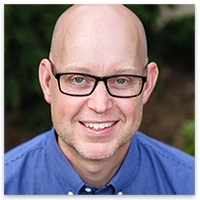
High-Impact Faculty: Teach-In Pairings, Nov 7-8, 2018
Colleen Brice, PhD & Lindsay Ellis, PhD
Code-Meshing: What's that? How's it done? and Why Try it?
Lindsay Ellis (faculty) with Colleen Brice (faculty) and Patrick Johnson & Melanie Rabine (staff) and Grace Irwin & Richard Vegh (students).
This session defined code-meshing and shared the call by scholars of color for more opportunities to code-mesh, and explored ways in which code-meshing connects to the university’s mission to help students transform their lives and their communities, when many communities don’t communicate in academic English.
Amy Masko, PhD
Privilege Across National Boundaries: US & Ghana
Amy Masko (faculty) with MacKenzie Currie, Katie Dickson, Davenport Shelinda, Angel Moore & Taylor Scherman (students).
This panel discussed their encounters with privilege in the United States and in Ghana, West Africa, which they experienced on a study abroad trip in summer 2018. Each panelist addressed the intersectionality of privilege in Ghana and the US, juxtaposing experiences in both contexts, as they relate to race, gender, and nationality.
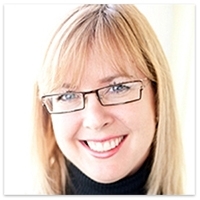
Karen Pezzetti, PhD
Strawberry margaritas, pole dancing and fauxhawks: How much of your gender expression is your choice?
Karen Pezzetti (faculty) with Stephanie Voelck, Brooke Fugate, & Sarah McLellan (students).
This workshop explored how society’s norms about gender and sexuality shape the lives of people who do not identify as LGBTQ, and the ways that gender may restrict and/or liberate all of us in our day-to-day lives.
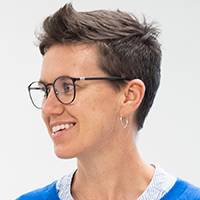
Kate Remlinger, PhD
What it means to be 'local'; Identity in the Multimodal Linguistic Landscape of Holland, Michigan
Kathryn Remlinger (faculty) with Alice Pozzobon, Tristan Kittle & Richard Vegh (students).
A focus on the intersection of language use, language attitudes, identity, and tourism in public spaces to understand their effects on what it means to be 'local' and on shaping the identity of a city.

Great Reads! Faculty Book Reviews
Kathleen Blumreich, PhD
Last semester, I've been on an Ottessa Moshfegh jag. Eileen and My Year of Rest and Relaxation feature strong female protagonists who are strangely intriguing, even if they aren't particularly likable. Moshfegh's work is not for the easily offended: her prose is blunt, but richly symbolic; her themes are darkly ironic, often disturbing. I am currently reading McGlue, a novella that focuses on a despicable sailor. Next up: Homesick for Another World, Moshfegh's collection of short stories.
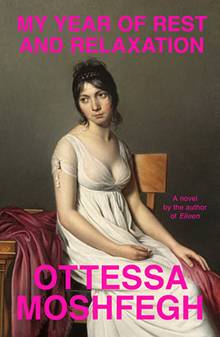
My Year of Rest and Relaxation by Ottessa Moshfegh
Jim Persoon, PhD
The new book of poetry I read this year was Fatimah Asghar's debut collection, If They Come For Us, exploring in such innovative poems as "Microaggression Bingo" and "Look, I'm Not Good at Eating Chicken" what it's like to be a Pakistani Muslim girl in America. On their deepest level, her poems go beyond the current narrative of violence by and against Muslims to lay out the long inheritance of violence and loss from The Partition. I'm now reading Gish Jen's The Girl at the Baggage Claim: Explaining the East-West Culture Gap. I recommend both books to anyone interested in cultural understandings and misunderstandings.
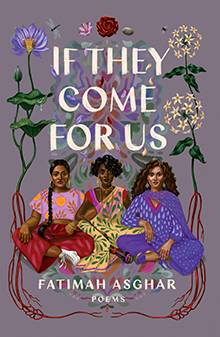
If They Come for Us by Fatimah Asghar
Ashley Shannon, PhD
Last semester I read two fantastic books that pair really well together: Madeleine Miller’s Circe and Pat Barker’s The Silence of the Girls. Both immerse readers in Homer’s Greece, but center female characters who play only minor roles in The Iliad and The Odyssey. Both have compelling narrative voices and fantastic world-building. Check them out if you love mythology, historical fiction, and complex protagonists!
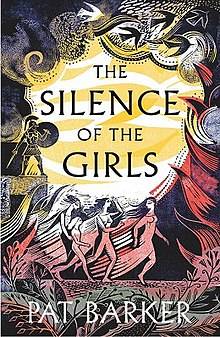
The Silence of the Girls by Pat Barker
Revelations
Rob Franciosi, PhD
Frieda Goldstein was born on January 12, 1871, in the Polish town of Oświęcim, then part of the Russian empire. After the birth of her son in 1902, she moved as a single mother to Berlin where she worked as a seamstress for the next thirty-nine years. Her son Samuel became a dentist and as late as the summer of 1939 she shared an apartment with him at 19 Fehrbelliner Strasse. Then the paths of this Jewish mother and son—and their fates—diverged. Samuel escaped to England just seven weeks before the war began. Frieda remained in Berlin until October 1941, when she was deported back to Poland, though not to her hometown of Oświęcim, but to the ghetto in Łodz. From there, seven months later, she was sent to the Chelmno death camp and murdered on May 15, 1942.
My interest in the stories of Frieda and Samuel Goldstein emerged largely by chance. During a trip with students to Germany and Poland, we were moved by the many stolpersteine we came upon in Berlin--small brass markers set in the sidewalks outside the former residences of Nazi victims, commemorating both lives (hier wohnte/here lived) and fates (ermordet/murdered)—and decided to sponsor one for a random Jewish victim, someone who had lived near our hostel off Rosenthaler Platz. That’s how my discovery of and journey with Frieda Goldstein began, and next summer I will return to Berlin for the stolpersteine installation.
My scholarship often addresses intersections of literature and history, but the more I learn about these two strangers, the more I am drawn toward narrative and memoir as a response. It’s the only way I can face the irony of Frieda’s origins in Oświęcim, a town indelibly linked to Jewish endings. For all her sufferings, at least she was spared an encounter with what the Nazis had perpetrated in her hometown, the place they called Auschwitz.
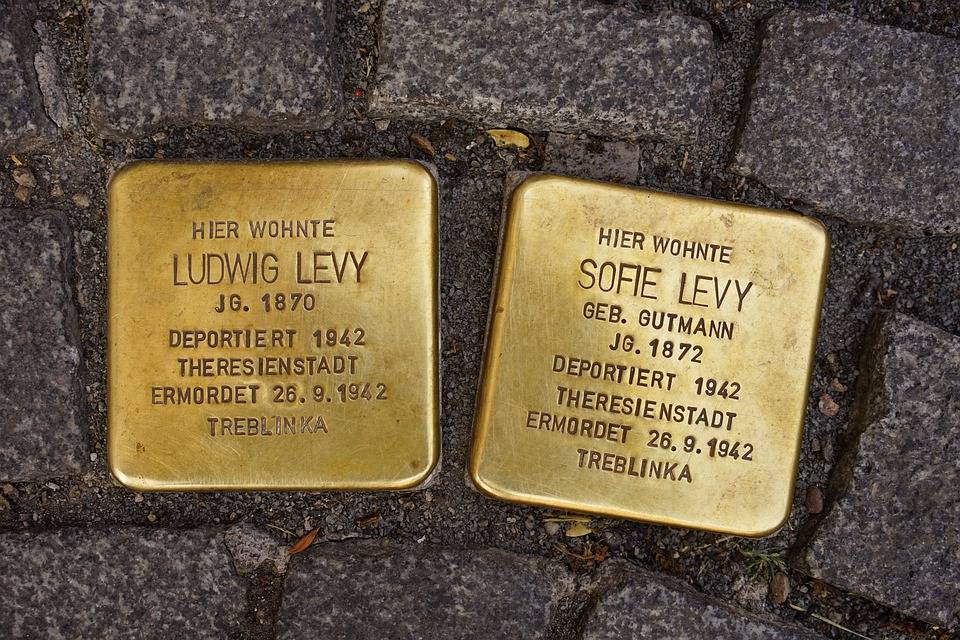
Sufen Lai, PhD
It is inevitable that transitions in life, no matter in what form, call for some sort of reckoning. Since my departure from GVSU in December 2017, I have had to cope with various transitions, starting with social and geographical repositioning (jobless and relocating out of the U.S.), then familial and psychological upheavals followed. Two Taiwanese terms that were reintroduced to me during this period of reckoning have now taken on new meanings with new contexts.
More than three decades ago in 1984, I left Taiwan for graduate study in the U.S. when I was 23 years old. Ever since then, I had not had the chance to be more than a visiting daughter to my parents. It was therefore quite unfortunate and overwhelming at times when, finally I was available to be with my parents, my mother was diagnosed with early stage dementia, and my father, who had cared for my mother in the last 9 years, was stricken with debilitating illness. In October last year, my father passed away. It was a trying 10 months to bear witness to my parents’ sufferings. During my parents’ illness and my father’s passing last year, I was constantly comforted and reminded by relatives and friends in Taiwan that what I was going through was part of everyone’s “homework” in life. Back when I was growing up in Taiwan during the 60s to the early 80s, the term “homework” was used literally without much deeper meaning or metaphorical sophistication. In the last two decades, the term has taken on a new life and become a popular metaphor for life’s lessons. It also assumes a somewhat Buddhist flavor, suggesting that doing “homework” of life is part of the path to enlightenment. Different stage of life thus mandates different “homework.”
Another somewhat cliché expression, fang xia, that I was re-acquainted to, is a term Taiwanese now often use to comfort someone coping with life’s ups and downs. It literally means “laying things down” or “putting things down,” a Taiwanese equivalent to the English “letting go.” However, for me the Taiwanese term is slightly different in spirit. “Letting go” in English, though intends acceptance, yet has underlying loss and departure, while fang xia emphasizes rest and unloading.
The Taiwanese term reminds us that we sometimes carry too much stuff with us and it’s better to just lay things down or unload. Doing my “homework” and “unloading” are now two main metaphors of my life.
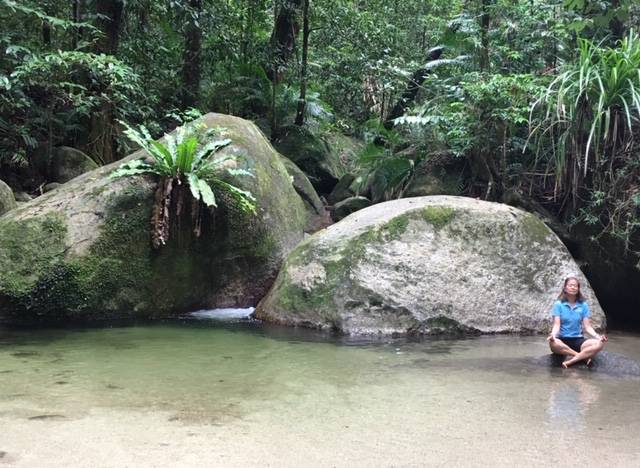
Professor Lai, pictured in the Daintree National Park, near Cap Tribulation, Queensland, Australia
Brian White, PhD
When I finished my Ph.D., I felt relieved that I’d never have to take another class. I wasn’t tired of learning; in fact, I was grateful that being a professor at Grand Valley would allow me to keep studying, reading, and writing about things that were (and are) very important to me. But I never considered taking a class. I was too busy. And besides, didn’t having a Ph.D. mean that I was done being a student? My colleague, Sufen Lai, taught me otherwise. A dedicated teacher and a fine scholar, Professor Lai consistently carved out time to take classes even as she taught classes. About seven years ago, I decided to follow her example and enrolled in a series of courses in Spanish conversation, composition, and grammar. Taking the classes changed me as a person and as a teacher/scholar. It also reminded me that I love being a student.
So, after finishing those courses in Spanish, I decided to study something else I’ve always wanted to know more about: the teaching of English as an additional language. In my nearly thirty-year career in West Michigan’s public schools, working with and training English teachers, I’ve witnessed the changing demographics, especially the tremendous increase in the number of students who are often referred to as English Language Learners (ELLs). I want to know how I can better prepare future teachers to work with ELLs, and I want to know how I can personally help older adolescents and adults learn English; so I am now enrolled in our department’s MA in Applied Linguistics program. As a graduate student (again), I am discovering that there is a powerful, productive relationship between being a student and teaching students. As I pursue this new master’s, I continue to learn things -- beyond the subject matter -- that are changing me as a professor and as a human being. And I love that working at a university allows me to keep exploring issues, ideas, and subject matter that continue to call to me.
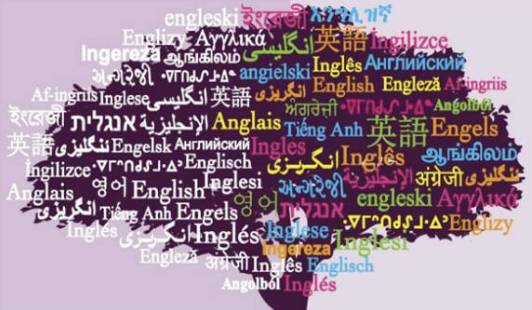
English Department 2019 Awards Ceremony
Grand Valley State University's English Department Awards Ceremony was held on Friday, April 19, 2019, from 4:00 p.m. to 6:00 p.m. at the Russel H. Kirkhof Center on the Allendale Campus. English Department Chair, Dr. Ashley Shannon, presided over the ceremony, and presented student awards, along with Dr. Rob Franciosi, Dr. Patricia Bloem, Dr. Dawn Evans, Dr. Karen Pezzetti, Dr. Shinian Wu, Dr. Rob Rozema, Dr. Rachel Anderson, and Dr. Avis Hewitt. Congratulations to all of the award recipients!
The English Department Scholarships
The English Faculty Scholarship for New Majors - Madison Twyman
The Robert L. Chamberlain Memorial Scholarship - Hannah Robinson; Lyndsay Mosby
The Dr. Andrew M.C. Brown Memorial Scholarship - Richard Vegh
The Gilbert R. & Patricia K. Davis Merit English Scholarship - Aimee Ash; Anisa Everett; Katrin Schneider, '19
The English Department Awards
Book Awards - Cyrena Johnson, Paige Spender
The Distinguished Performance in Applied Linguistics Award - Richard Vegh; Madelaine White, '19
The Distinguished Performance in Elementary Language Arts Award - Mary Lehmann, '19
The Distinguished Performance in Secondary English Education Award - Kelsie Fernsler, '19
Distinguished Performance in Literature Award - Emily Heyburn, '19
University Department Award - Tiha Kabir, '18; Nicholas Langenberg; Thomas Rodgers, '19
The English Department Study Abroad Scholarships
UK Study Abroad Scholarship:
Undergraduate - Ashley Hull; Kennedy Sauer
Graduate - Ashley Quinn
Ghana Study Abroad Scholarship:
Mariko Minton; Hannah Shorkey
Maastricht Study Abroad Scholarship:
Delona Davis; Haley Marek
The English Department Oldenberg Writing Contest Winners
Personal, Analytical, or Persuasive Essay - Freshman:
First Place - Natalie Luterman; Second Place - Sidra Elvey; Third Place - Rylee Prach; Honorable Mention - Rachel Les
Personal Essay - Sophomore, Junior or Senior:
First Place - Emily Zerrenner, '19; Second Place - Daniel Oswalt, '19; Third Place - Leah Wilcox, '19
Analytical and Persuasive Essay:
First Place - Daniel Sumbal, '19; Second Place - Isabella Haskin; Third Place - M. Claire O'Neill; Honorable Mention - Brooke Fugate
Poetry:
First Place - Aleigha Kely; Second Place - Nick Kondyles, '19; Third Place - Maria McKee, '19; Honorable Mention - Chloe Stegman
Drama:
First Place - Seth Miller; Second Place - Chavala Ymker
Fiction:
First Place - Zach Sheneman; Second Place - Marion Jamet, '19; Third Place - Cierra Bakovka, '19; Honorable Mentions - Aric Davis, '19; Hannah Kelly; Julianna Schrier
Essay, Poetry, Fiction, or Drama - Graduate Student:
First Place - Nicholas Langenberg; Second Place - Nic Kanaar, '19; Third Place - Emily Feldman, '18
Sigma Tau Delta Honor Cords
Kimberlie Blauwkamp, '19; Patricia Durell, '19; Emily Heyburn, '19; Nic Kanaar, '19; Marta Norkus, '19; Alice Pozzobon, '19; Brandon Skwier, '19; Mallory Stevenson, '19; Emily Suchowolec, '19; Nathan Teft, '19; Megan Wills, '19
Follow us on Social Media for the latest happenings in the English Department!
English Matters
Published by the GVSU English Department
December 2019
Dr. Sherry Johnson, Editor
Jennie Reed, Assistant Editor
Vicki Stein, Communications Graduate Assistant
To view a PDF version of our printed newsletter, please click on the following link: English Matters Fall 2019

